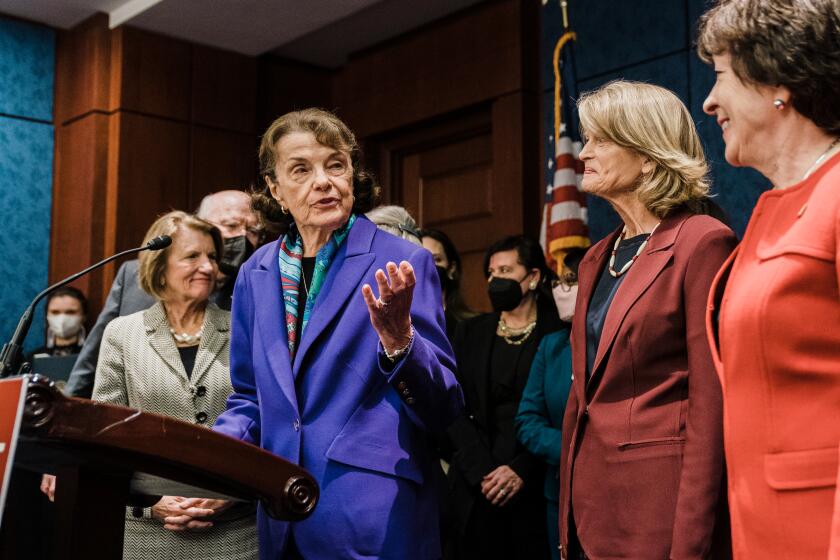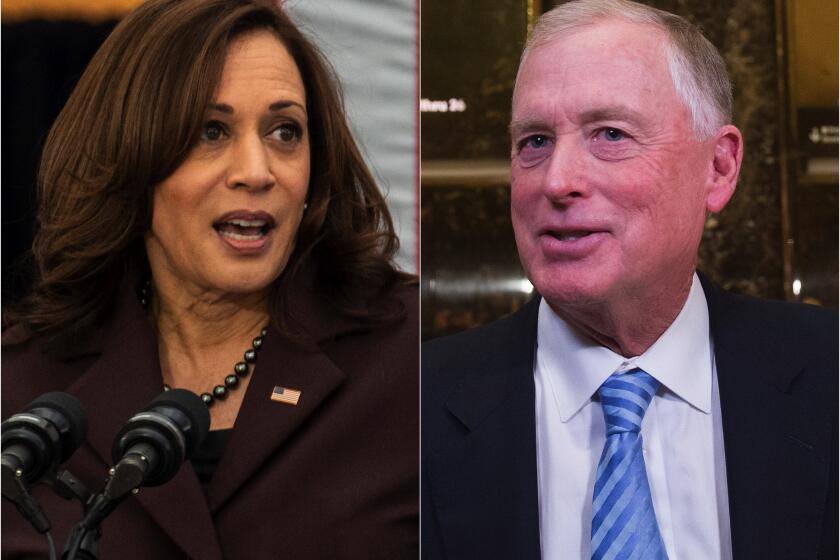Column: Where’s the love? Here’s why Kamala Harris’ California poll numbers stink
In Montana, they describe the state as one small town with a very long main street.
People know their politicians on a first-name basis, and if they’re not necessarily considered a friend, they at least have the familiarity of a neighbor.
California might be described as a collection of various states, with no single thruway.
It’s possible to spend a lifetime within its borders and never come remotely close to one of California’s elected statewide leaders, who are most often seen as strangers, or known by whatever image of them shows up on television.
Which helps explain why Vice President Kamala Harris faces such dismal approval ratings among her fellow Californians.
“Voters don’t know her that well,” said Katie Merrill, a longtime Democratic strategist.
And that’s after four statewide elections.
What they do know is largely refracted through the negative publicity Harris has faced as a result of her travails in the White House — less-than-sure-footed appearances, an onerous portfolio — and her failed 2020 run for president.
It’s not a great look and has done nothing to ease the doubts voters had even before California’s junior U.S. senator assumed the vice presidency.
Sen. Dianne Feinstein gets the lowest approval rating of her career in the latest Los Angeles Times/Berkeley IGS poll. President Biden and Vice President Kamala Harris also fail to get strong approval in an overwhelmingly Democratic state.
A recent poll conducted by UC Berkeley’s Institute of Governmental Studies and co-sponsored by the Los Angeles Times found just 38% of the state’s voters approved of Harris’ performance as vice president, while 46% disapproved. That’s a sharp drop from last summer and, not surprisingly, tracks a similar decline in President Biden’s standing.
As Merrill pointed out, “The vice president’s ratings are almost always tied to the president’s ratings. [Biden] is struggling right now so it makes sense that Kamala Harris, as vice president, would also be suffering.”
It’s also typical for a vice president’s approval ratings to lag those of the president. The job, which consists of doing whatever the chief executive wants and never, ever overshadowing him, is inherently subservient and diminishing. That’s true whether the vice president is male, female, white, Black or Asian American.
What may be surprising — at least superficially — is the fact that Harris isn’t doing better among those who presumably have a rooting interest in her success, her fellow Californians. Home-state pride and all that.
But as Harris learned during her ill-fated White House bid, there is no such thing as a favorite son or daughter in California politics.
Not long before she quit the 2020 contest, polls showed Harris running a distant fourth among Democratic hopefuls, with support from fewer than 1 in 10 of her fellow Californians. It wasn’t just Harris; former Gov. Jerry Brown lost the state in two of his three presidential runs.
That’s the nature of California politics.
People might come to blows rooting for the San Francisco Giants versus the Los Angeles Dodgers. But no one, outside of immediate family, paid staff and some political activists, develops that sort of devotion to, say, their governor or California’s two U.S. senators.
The state is physically huge, and with nearly 40 million residents, the only way to effectively campaign is through TV advertising and social media. That’s not like someone standing in your living room or dropping by your coffee shop to ask for your vote, and it doesn’t make for a very lasting or intimate connection.
Harris’ dismal approval rating among Republicans surveyed in the UC Berkeley poll — just 5% — was no surprise. Nor was her poor standing among voters without a party preference, with just 31% approving.
What’s noteworthy was her relatively tepid showing among fellow Democrats. While 61% approved of Harris’ job performance, more than 1 in 5 gave her poor marks for her handling of the vice presidency.
“Democrats have never really warmed up to the idea of her in that post,” said Mark DiCamillo, who directed the poll. “When she ran for president she wasn’t well-received ... and now that she’s vice president it’s kind of the same thing.”
Harris is just the latest vice president to learn the job is ripe for ridicule.
Harris may have run statewide four times in 12 years (twice for attorney general, once for U.S. Senate and in November 2020 as Biden’s running mate). But that doesn’t mean she left a strong imprint; two years into her Senate term and after a splashy entry into the presidential race, nearly a quarter of California voters had no opinion of her job performance, suggesting they knew or cared very little about what she’d done.
That’s not a knock on Harris. Most Californians pay scant attention to politics outside a brief window during election season, or when Donald Trump is setting a torch to our civic norms and institutions.
But it does explain why there’s no deep well of personal support for the Oakland native as she struggles to find her footing in the vice presidency. There’s no sense of attachment, no particular relationship with voters.
There is, of course, plenty of time for Harris’ standing to improve. Like the proverbial rising tide, an improvement in Biden’s poll numbers could buoy his vice president as well. Russia may pull out of Ukraine. Inflation may subside. COVID-19 may become an unhappy memory.
But when and if Harris seeks the Democratic presidential nomination — in 2024, 2028 or beyond — one thing she can’t count on is having California in the bag. There is no such thing here as a home-field advantage.
More to Read
Get the latest from Mark Z. Barabak
Focusing on politics out West, from the Golden Gate to the U.S. Capitol.
You may occasionally receive promotional content from the Los Angeles Times.













